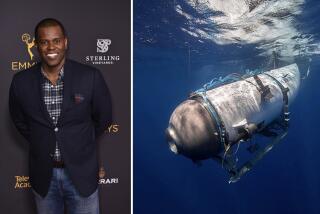The BP oil spill comes to movie theaters
- Share via
Working-class heroes and a five-year gestation period are among the axioms for making a fact-based movie in Hollywood. Both appear to be playing out for “Deepwater Horizon,” a long-developing, newly resurgent project based on the 2010 BP oil-rig disaster.
On Tuesday, Deadline reported that Mark Wahlberg could join the film, which already has “All Is Lost” helmer J.C. Chandor returning to the nautical disaster realm. Produced by Lionsgate’s Summit and based on a New York Times article, the film looks at men on the infamous rig in the hours leading up to the disaster. The film has had several iterations -- an earlier version with action director Ric Roman Waugh didn’t get off the ground — but appears to now be moving forward.
“Deepwater” is an interesting new addition to a kind of disaster-movie subgenre — the one where we know how it all turned out but we want to watch the human stories beneath anyway (see under: “Captain Phillips”). And though set in a radically different world, the motifs here are similar to “Lone Survivor,” Wahlberg’s working-class drama about gritty men fighting for their lives in dire conditions. That wouldn’t be a bad model for this movie to follow — the war film took in a surprising $125 million at the domestic box office.
Still, as newsworthy and important as the Deepwater Horizon story was — 11 people killed, 16 injured, billions in damage that continues to this day — the BP oil spill may not be as easy to sell as a war story is, coming, as it does, in a less well-trod (and often more expensive) genre of the seaside disaster picture. What’s more, though there were no doubt heroes on the rig, the lingering feeling most of us have about the disaster nearly five years later is essentially one of unbridled calamity and corporate malfeasance -- a somewhat less complicated view than most of us take toward U.S. troops.
Filmmakers remain interested, however. On Wednesday, in a well-timed announcement, Radius said it had acquired “The Great Invisible,” a documentary on the aftermath of the Deepwater Horizon disaster directed by the nonfiction filmmaker Margaret Brown. It will open the film later this year.
The movie, which also has the backing of Participant, takes a look at the cities and towns across the American South that have been affected by the economic and environmental fallout that followed after hundreds of millions of gallons of oil spilled into the water off the coast of Louisiana.
“Years later,” a release stated, “the Southern Americans still haunted by the Deepwater Horizon explosion provide first-hand accounts of their ongoing experience, long after the story has faded from the front page.” A few movie studios will try to make sure that the story stays in movie theaters, at least.
More to Read
Only good movies
Get the Indie Focus newsletter, Mark Olsen's weekly guide to the world of cinema.
You may occasionally receive promotional content from the Los Angeles Times.







